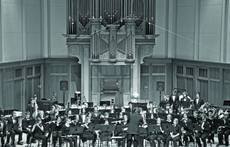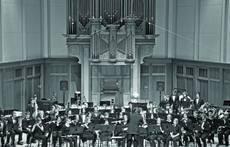
(Nhi Nguyen)
The Lawrence Symphonic Band and Wind Ensemble performed its last concert of the year Saturday, May 15 in Memorial Chapel. A full balcony of enthusiastic students and Appleton residents showed their support for the students as well as guest composer David Maslanka and guest trombone soloist Todd Baldwin.
David Maslanka is well known amongst wind and percussion players for his composition “A Child’s Garden of Dreams,” although he has composed many other chamber, orchestral and choral pieces.
When reflecting on the previous days spent with Maslanka on campus, conductor Andrew Mast said, “It was an amazing week with the master classes, rehearsals, lessons and general sessions. Working on the three pieces with a composer of his stature, intellect and depth of musicianship was simply amazing.”
Trombone soloist and Master Sergeant Todd Baldwin has served with the U.S. Army Ceremonial Band “Pershing’s Own” and is currently section leader in the band. His other accomplishments include performing in the opening ceremonies of the 1996 Summer and 2002 Winter Olympics.
The concert opened with an introduction and welcome from Mast. Symphonic Band’s graduating seniors were acknowledged with readings of their favorite memories from the year.
The first piece was a complex composition by David Maslanka called “Golden Light: A Celebration Piece” that ended with the band playing in unison. The second piece, “Colloquy for Solo Trombone and Symphonic Band,” featured Baldwin playing an impressive trombone solo in full uniform.
After intermission, Mast returned to introduce Wind Ensemble and acknowledge the many graduating seniors in the group. He then introduced Maslanka, who said a few words about his next two pieces.
The soft-spoken Maslanka stated that since he’s not a social person, it feels like he is “lifting [his] rock to come out in public,” but that “making music is community.” He put a lot of emphasis on the importance of community and communication of the soul through music. He described music as a kind of saving force that helps us through tough times.
The first piece, “Tears,” was written as a personal expression of pain, but Maslanka mentioned that he feels that the piece was a result of a deeper force that needed to get out to the world.
He later introduced the second piece, “Symphony No. 8,” as an epiphany that “we will not destroy ourselves on this planet.” He believes that self-destruction is a potential, but not necessarily our future.
Maslanka utilizes meditation in composing and feels that music is a powerful force that becomes what it wants to become and does not result from personal feelings or motivations. One of the three movements was based on Bach’s “Jesu, Meine Freude,” which could be recognized throughout the movement.
After introducing this final piece, Maslanka joined the audience in the balcony and watched intently as the Wind Ensemble played “Symphony No. 8.” He looked extremely involved in the music as the ensemble played and, at times, almost seemed to conduct along.
When asked about rehearsals with Maslanka, freshman horn player Ethan Landes said, “As soon as we started playing, I could tell he was completely submerged in his music.”
One thing that struck me about the Symphonic Band and Wind Ensemble was how connected the students seemed. The members’ favorite memories that Mast read covered a wide range of situations, from playing concerts to crazy rooming situations during band tours.
Many memories linked back to fellow students or Mast somehow, which showed the student bonding that comes with Symphonic Band and Wind Ensemble. This connection, as well as Maslanka’s presence, contributed to an impressive concert. According to Mast, “Things clicked in a way that doesn’t always happen – but it was amazing.

(Nhi Nguyen)
